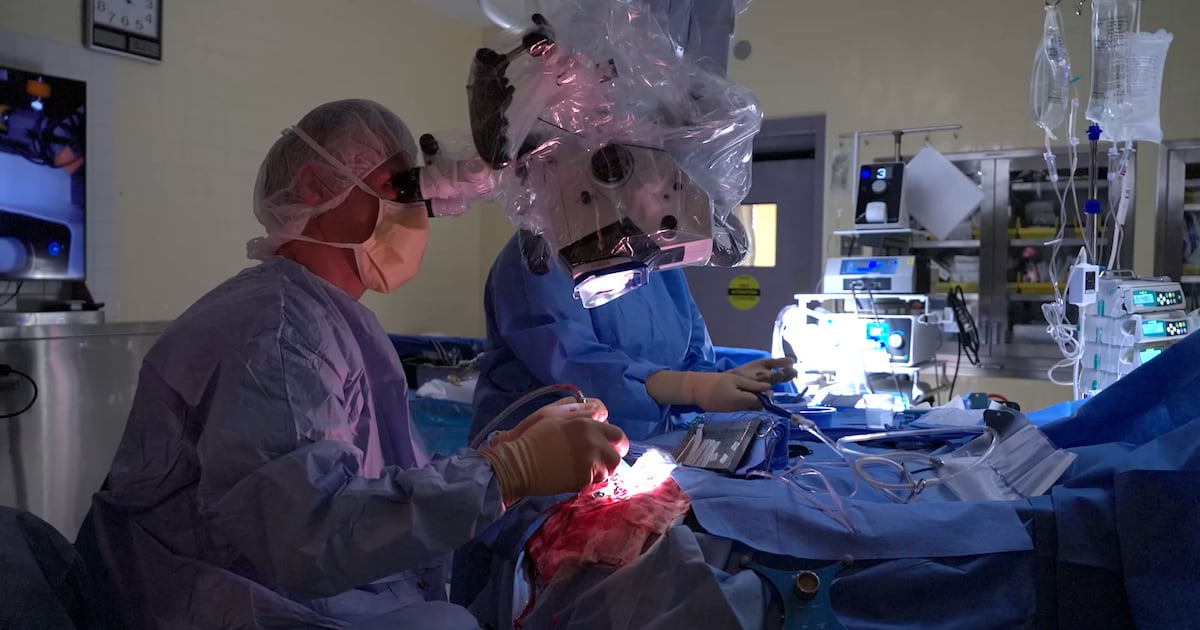Science
Montreal’s AI Surgical Device Offers New Hope for Patients

A groundbreaking surgical device developed in Montreal is transforming cancer treatment, significantly extending patients’ lives. Peter Ross, who was diagnosed with a brain tumor nearly four years ago and given only 14 months to live, credits this innovative technology with giving him a second chance. He and his wife, Sandrine Menard, are now preparing to become grandparents, a milestone they believed may never come.
The device, known as SENTRY, is a handheld tool that utilizes artificial intelligence (AI) to distinguish between cancerous and healthy tissue during surgery. This advanced technology, co-founded by Dr. Kevin Petrecca at the Montreal Neuro, boasts an impressive accuracy rate. “98.7 per cent of the time, if it says it’s tumor, it’s tumor,” Dr. Petrecca stated. “Equally or maybe even more importantly, if it says normal brain, it’s normal brain 100 per cent of the time.”
Cancerous cells are often invisible to the naked eye and traditional imaging methods, making SENTRY a vital tool for surgeons. The device provides feedback within three seconds when it comes into contact with tissue, allowing for precise removal of cancer. Dr. Petrecca explained that this technology enables surgeons to excise more cancerous tissue than ever before, enhancing patient outcomes.
According to Dr. Petrecca, the use of SENTRY during surgery can potentially extend a patient’s life by two to five times longer than expected. While primarily tested in brain surgeries, SENTRY is also applicable in detecting cancers in other areas, including the breast and lungs. Hundreds of patients, including Ross, have participated in clinical trials to assess the device’s effectiveness.
Ross expressed his gratitude for the extra days he has been given, stating, “I take every extra day that’s given to me to go out and walk, and just enjoy life because I owe that to this surgery.” His story exemplifies the profound impact that medical advancements can have on individuals and their families.
The next milestone for SENTRY is obtaining FDA approval. A pivotal trial is scheduled for May 2024, which Ross hopes will pave the way for broader access to this life-saving technology. As more patients are treated with SENTRY, the potential for significant improvements in cancer care continues to grow, offering hope to those facing similar diagnoses.
-

 Science3 months ago
Science3 months agoToyoake City Proposes Daily Two-Hour Smartphone Use Limit
-

 Health4 months ago
Health4 months agoB.C. Review Reveals Urgent Need for Rare-Disease Drug Reforms
-

 Top Stories4 months ago
Top Stories4 months agoPedestrian Fatally Injured in Esquimalt Collision on August 14
-

 Technology3 months ago
Technology3 months agoDark Adventure Game “Bye Sweet Carole” Set for October Release
-

 World3 months ago
World3 months agoJimmy Lai’s Defense Challenges Charges Under National Security Law
-

 Lifestyle4 months ago
Lifestyle4 months agoVictoria’s Pop-Up Shop Shines Light on B.C.’s Wolf Cull
-

 Technology3 months ago
Technology3 months agoKonami Revives Iconic Metal Gear Solid Delta Ahead of Release
-

 Technology3 months ago
Technology3 months agoApple Expands Self-Service Repair Program to Canada
-

 Technology3 months ago
Technology3 months agoSnapmaker U1 Color 3D Printer Redefines Speed and Sustainability
-

 Technology3 months ago
Technology3 months agoAION Folding Knife: Redefining EDC Design with Premium Materials
-

 Technology4 months ago
Technology4 months agoSolve Today’s Wordle Challenge: Hints and Answer for August 19
-

 Business4 months ago
Business4 months agoGordon Murray Automotive Unveils S1 LM and Le Mans GTR at Monterey









